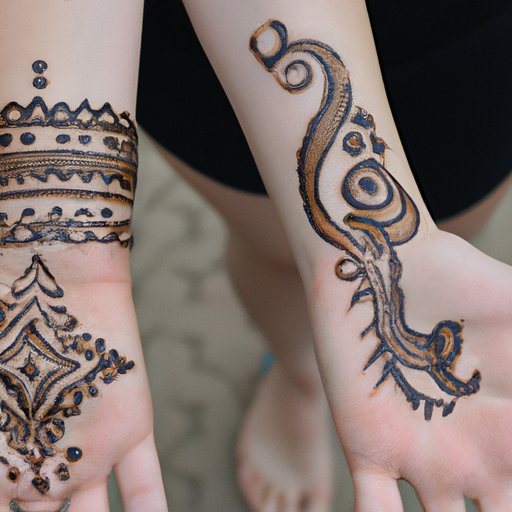Introduction:
Henna tattoos have become increasingly popular in recent years, as a growing number of people are turning to this form of body art for its unique beauty and temporary nature. However, there has been much debate surrounding the issue of henna tattoos and cultural appropriation, as some argue that it is an inappropriate borrowing of traditional symbols and practices from other cultures. In this article, we will explore the history and meaning of henna tattoos, examine the debate around cultural appropriation and henna tattoos, unpack the pros and cons of henna tattoos, investigate how different cultures view henna tattoos, and discuss the impact of henna tattoos on identity.

Exploring the History and Meaning of Henna Tattoos
Henna tattoos, also known as mehndi, have their origins in ancient India, where they were used for religious and spiritual ceremonies. Henna is a dye made from the leaves of the Lawsonia inermis plant, which was used to create intricate designs on the hands and feet of brides before their weddings. These designs were said to bring health, luck, and good fortune to the couple, and were often seen as a symbol of fertility.
Henna tattoos have also been used in other parts of the world, such as the Middle East, Africa, and South Asia, for similar purposes. In these regions, henna tattoos are often used to mark important life events, such as births, marriages, and religious festivals, and are often seen as a way to bring good luck and protection. Henna tattoos can also be used as a form of self-expression, with many people using them to express their cultural or religious identity.

Examining the Debate Around Cultural Appropriation and Henna Tattoos
Cultural appropriation is defined as the act of taking or using elements from one culture by another without permission or understanding. In the context of henna tattoos, this could include using symbols and designs from other cultures without considering their deeper meaning or significance. This can be problematic as it can lead to a misunderstanding of the symbols and practices associated with henna tattoos, as well as a lack of respect for the culture and people who originated them.
There have been several examples of cultural appropriation with henna tattoos, such as when western celebrities have been photographed wearing henna tattoos without understanding the deeper meaning behind them. There have also been instances of people offering henna tattoos at festivals and events without having any knowledge of the cultural significance of the designs, or of the potential implications of cultural appropriation.
The potential implications of cultural appropriation with henna tattoos can be far-reaching. For example, it can lead to a loss of cultural identity for those whose traditions and practices are being appropriated, as well as a lack of respect for the beliefs and values associated with the designs. It can also result in a misrepresentation of the culture from which the designs originate, as well as a disregard for the people who created them.
Unpacking the Pros and Cons of Henna Tattoos
Despite the potential for cultural appropriation, there are also some advantages to henna tattoos. For example, they are a safe and non-permanent form of body art, making them ideal for those who want to experiment with tattoos without the commitment of a permanent design. They are also relatively inexpensive, and can be used to express creativity and individuality in a way that is not possible with traditional tattoos.
However, there are also some disadvantages to henna tattoos. For example, they are not always applied correctly, and can cause skin irritation or infection if not done properly. They can also fade quickly, meaning that they need to be reapplied frequently. Finally, there is the risk of cultural appropriation, as mentioned above.
Investigating How Different Cultures View Henna Tattoos
Henna tattoos are viewed differently in different cultures. In Indian culture, for example, henna tattoos are often seen as a symbol of joy and celebration, and are often used to mark special occasions such as weddings and festivals. In Middle Eastern culture, henna tattoos are often used to express identity and spirituality, and are often seen as a form of prayer or blessing. In Western culture, henna tattoos are often viewed as a fashion statement, with many people using them as a way to express their individual style.

Discussing the Impact of Henna Tattoos on Identity
Henna tattoos can be used to express identity in a variety of ways. For example, they can be used to honor cultural heritage, to celebrate personal milestones, or to represent religious beliefs. However, they can also be misused to oppress identities, such as when they are used to denigrate or stereotype certain cultures or groups of people.
Conclusion:
In conclusion, henna tattoos can be a beautiful and meaningful form of body art, but there is an important discussion to be had about cultural appropriation and how it can be avoided. We must be aware of the history and meaning behind the designs, and ensure that we are respecting the cultures from which they originate. We must also consider the potential implications of cultural appropriation, and ensure that we are not using henna tattoos to oppress or stereotype certain identities. With this in mind, we can enjoy the beauty and creativity of henna tattoos without risking cultural appropriation.
(Note: Is this article not meeting your expectations? Do you have knowledge or insights to share? Unlock new opportunities and expand your reach by joining our authors team. Click Registration to join us and share your expertise with our readers.)
